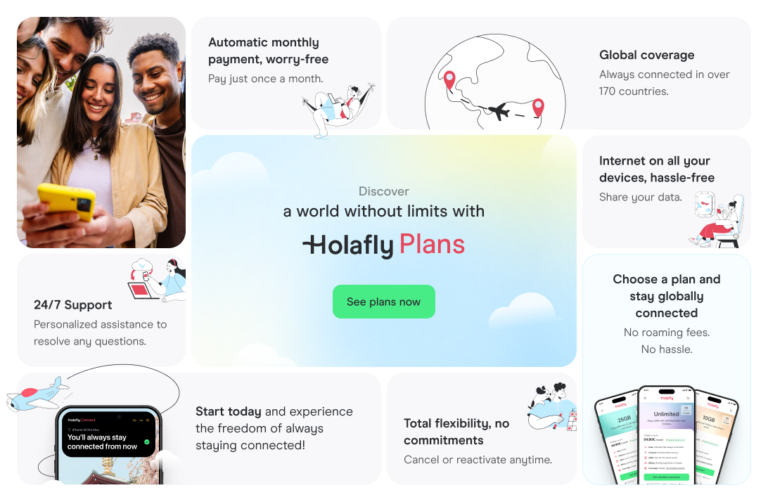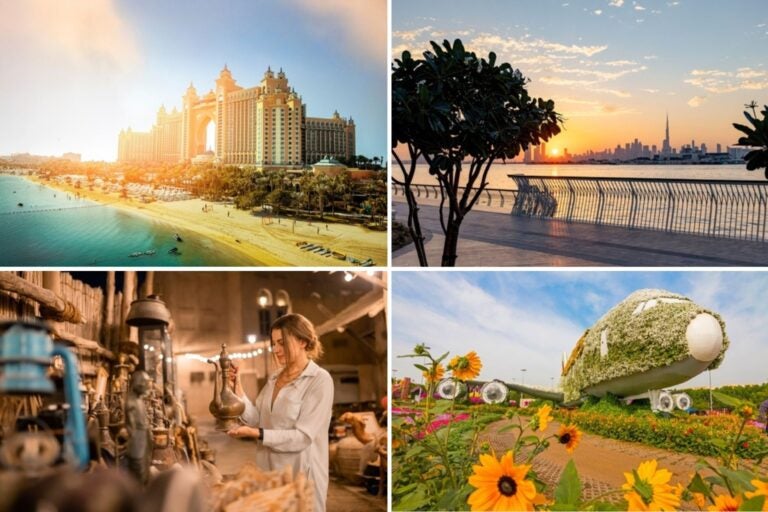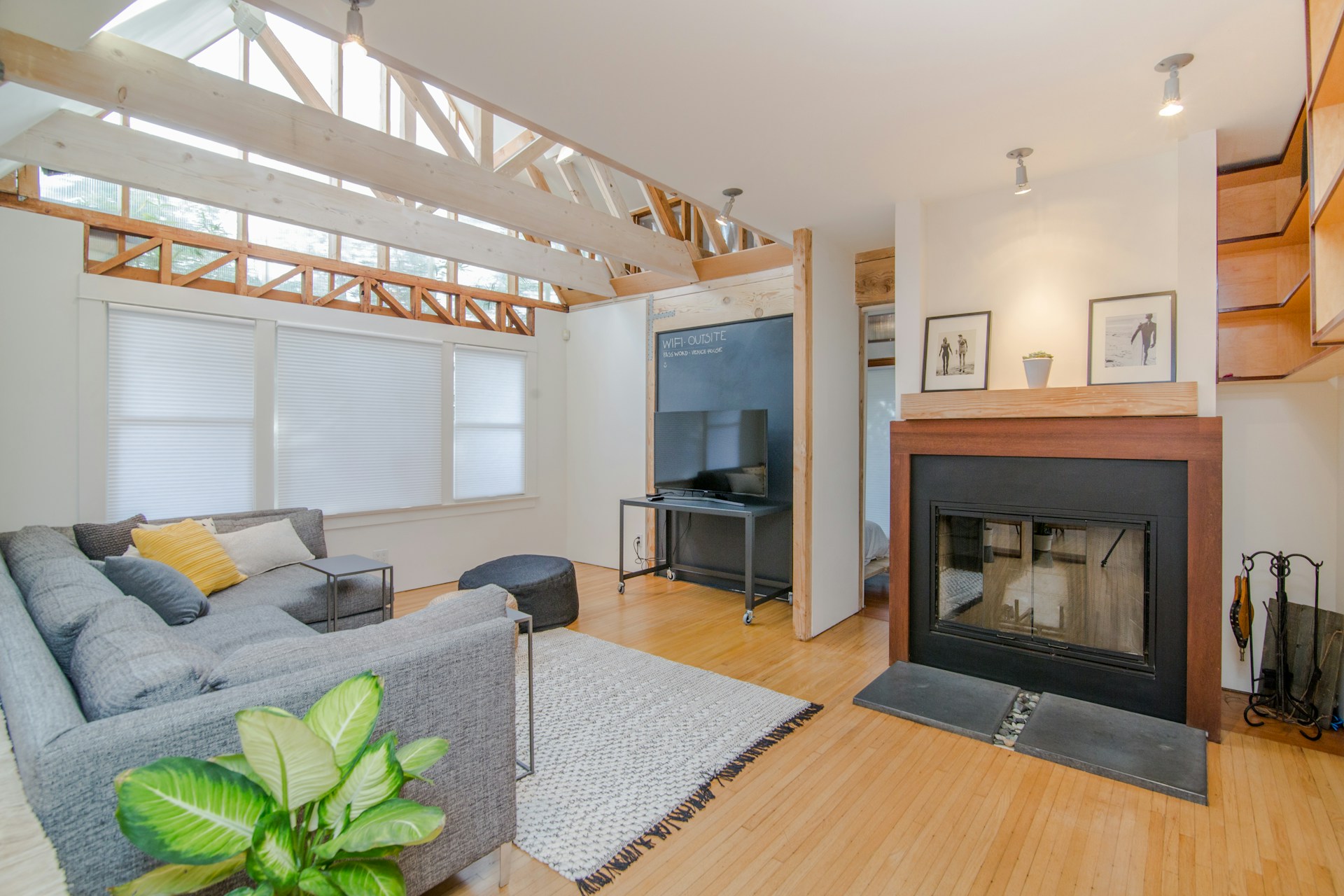Live in Dubai: Advantages, disadvantages & costs
Moving to the city of the Burj Khalifa? Knowing beforehand what it's like to live in Dubai will help you adapt to an incredible destination.
Modern living, endless opportunities, and year-round sunshine. But also different cultural norms, striking contrasts, and a fast-paced lifestyle. Thinking about making the move to this UAE city? Here’s everything you need to know if you want to live in Dubai as an expat.
Dubai ranks among the top cities to live in, thanks to its exceptional safety, world-class infrastructure, and high quality of life. It’s a global business hub offering plenty of opportunities for those moving there to work. It’s also one of the most multicultural and diverse destinations in the world.
The only real way to know if Dubai is right for you is by diving into reliable information, and that’s exactly what this guide is for. Get comfortable, take it all in, and start picturing what your future in Dubai could be.
What is the quality of life like in Dubai?
Dubai is known for luxury, innovation, and safety. It offers a high standard of living and plenty of well-paid job opportunities. That said, life here comes with its own set of rules, a demanding pace, and cultural differences you’ll need to adapt to.
Let’s dive into some key aspects that shape daily life in Dubai. From access to education and the cost of living, to safety, healthcare quality and costs, and important laws and regulations to keep in mind. The goal is to help you get fully prepared for your stay in the UAE.
1. Education in Dubai:
If you’re moving to Dubai with kids, it’s important to know that public schools are only open to Emirati nationals. That means expat families will need to look at private options — many of which offer international curricula like the IB, British, or American systems. Also, schooling is mandatory from the age of five, no matter your child’s residency status.
Dubai offers a wide range of high-quality schools, but they don’t come cheap. Annual tuition can range anywhere from $6,000 to $25,000, depending on the school and grade level. So if you’re moving with school-age kids, or planning to attend a private university yourself, be prepared to allocate a significant portion of your budget to education.
Most schools are located in areas such as Jumeirah, Al Barsha or Dubai Hills and offer school transportation, extracurricular activities and English language classes.
Fun fact about education in Dubai: During and after the pandemic, the UAE launched a smart education system that leveraged the country’s cutting-edge tech to ensure all students had access to quality learning. As a result, its remote learning model quickly became one of the most advanced in the world.
2. Security level:
Dubai is known as one of the safest cities worldwide, ranking fifth according to Numbeo, with very low crime rates. This contributes to the UAE being recognized as the second safest country globally. Most issues reported are minor thefts, usually in less wealthy areas. Thanks to strict laws and tough enforcement, crime is kept to a minimum and strongly discouraged.
Living in a place that truly prioritizes safety gives you real peace of mind. Something that matters even more when you have kids and want them to grow up in a secure, family-friendly environment.
Just a heads-up: While the country is very safe, it’s important to respect local customs and laws like dress codes in public, alcohol regulations, and proper behavior in shared spaces. Make sure to familiarize yourself with these rules to avoid any issues and show respect for the culture.
3. Cost of living in Dubai:
Dubai stands out as a global business and financial center, with plenty of job opportunities in fields like technology, construction, tourism, finance, and healthcare. People enjoy competitive, tax-free salaries, and the strong banking system gives expats confidence that their money is safe.
Highly skilled professionals often receive perks like health insurance, housing, flights home, and even a company car. For more physically demanding jobs, such as construction work, wages tend to be lower.
Dubai offers a lot, but it’s important to remember that living here comes with a high price tag. Rent is usually the biggest monthly expense, followed by education, healthcare, and private transportation. For example, a couple can expect to spend between $3,000 and $6,000 a month to live comfortably, depending on their lifestyle and neighborhood.
4. Health system and medical care:
When the seven emirates came together to form one nation, they faced important challenges to ensure a high quality of life for their citizens. One of their top priorities was building a healthcare system from the ground up. That led to the creation of Dubai’s first medical center, which over the years has grown into a network of hospitals equipped with advanced technology and staffed by highly trained doctors.
Thanks to these efforts, Dubai now boasts one of the most advanced private healthcare systems in the world. Facilities like Mediclinic and Dubai Healthcare City provide top-quality care, fast service, and internationally trained medical staff.
Public healthcare is mainly for Emirati residents, who get free medications. As an expat, you won’t have the same benefits, but with good health insurance, you can save a lot and get fast, quality care at the best hospitals and clinics—often with services in your own language.
5. Digital and technological infrastructure:
Dubai is a super connected city with fast fiber-optic internet, widespread 5G, and apps that make everything easier.
Providers like Etisalat and Du lead the market, and digital platforms are part of everyday life. Whether it’s renewing your visa, paying bills, or booking doctor’s appointments. If you work remotely, you can count on reliable connectivity without any issues.
Here’s a handy travel tip: To fully tap into Dubai’s awesome digital setup, try a monthly Holafly plan. With unlimited data, you can easily share your internet with other devices and stay connected wherever you go. Plus, if you head out to Oman, Qatar, Saudi Arabia, or anywhere else in the region (or beyond), the global eSIM means you won’t have to switch plans or worry about coverage.
Important: If you are a frequent traveler and want to stay connected without worrying about expensive roaming or looking for a new SIM at every destination, Holafly’s subscription plans are for you. With a single eSIM, enjoy internet in more than 170 countries for a fixed price and no surprises on your bill. Travel without limits and connect easily and securely! 🚀🌍

What are the main advantages of living in Dubai?
Living in Dubai comes with plenty of perks. For those who can adapt, it offers a unique mix of a high quality of life, safety, job opportunities, and constant exposure to cultures from around the globe. Before you start packing, check out this list of the main advantages of making Dubai your home.
1. Competitive and tax-free salaries
One of Dubai’s biggest draws is its tax system where there’s no personal income tax. Starting a business also comes with perks, including some of the lowest corporate tax rates worldwide. Plus, the VAT is just 5% on most goods and services, which is well below the global average.
While the cost of living is high, salaries often match up; especially in fields like tech, engineering, finance, healthcare, and marketing. This means many professionals are able to save or invest more than they could back home.
2. Modern infrastructure and efficient services
Dubai is designed to run like clockwork. The highways are spotless, the metro is automated and always on time, and public services are top-notch. (Did you know it’s one of the cleanest cities in the world?)
Resident comfort is a top priority for the government. That’s why air conditioning is everywhere. High-speed WiFi is also widely available, so whether you’re working from a coworking space or relaxing under a tree in the park, you’ll always stay connected.
As a truly modern city, Dubai has technology woven into almost everything. You can handle just about anything through apps—whether it’s paying for parking, managing immigration paperwork, booking a doctor’s appointment, ordering food, and more.
3. Multicultural environment and religious tolerance
Over 85% of Dubai’s population are expats, creating a truly multicultural atmosphere where people from more than 180 nationalities live side by side. It’s common to hear a variety of languages spoken in the same place.
Dubai stands out as one of the more tolerant emirates when it comes to religious beliefs. That’s why you’ll find mosques, temples, and churches all sharing the city’s streets. Islamic rules are respected but applied with moderation, so as an expat, you can buy alcohol and eat or drink during Ramadan (just not in public places).
4. Safety at all levels
As we said before, Dubai is one of the safest cities worldwide. Crime is rare, and while police are present, they don’t feel intrusive. You can comfortably walk around at night, leave your things on a table without stress, and even if you forget your phone in a taxi, it’s likely to be returned quickly.
This is especially appreciated by families with children and women living on their own. In fact, you’ll be glad to know that Dubai ranks among the top 10 cities worldwide for gender equality. The city promotes equal opportunities and fosters a supportive environment where women feel safe and empowered.
5. Activities for all tastes
Dubai has something for everyone. Whether you love outdoor adventures, shopping, or exploring museums and art spaces, there’s always a new experience waiting for you every day.
Some of Dubai’s highlights include golden beaches along the Persian Gulf, vast deserts and impressive mountain ranges, traditional souks, Michelin-starred restaurants, cultural centers, gyms, and some of the world’s largest shopping malls. All of this creates the unique blend of old and new that defines Dubai.
6. Flight connections with the rest of the world
Dubai serves as a major gateway with flights to more than 260 destinations from its international airport (DXB). It’s an ideal base for those who travel often for work, have family abroad, or simply love discovering new cultures.
7. A forward-looking city
Dubai is committed to sustainability and enhancing residents’ quality of life, which is why it has rolled out ambitious plans. One example is the Dubai Quality of Life Strategy 2033, aiming to create women-only beaches, plant over 300 trees, build more than 200 parks, and develop over 115 kilometers of pedestrian and cycling paths, among other initiatives.
This is just one of over 200 projects underway as Dubai aims to become one of the world’s top three economies in the next decade, all while keeping residents’ well-being and happiness front and center.

What are the challenges to consider when living in Dubai?
While we’ve highlighted all the perks of living in Dubai, it’s equally important to be aware of the challenges. Life here isn’t always as flawless as the towering Burj Khalifa, so it helps to know what you might face.
1. High living costs
While salaries tend to be high, the cost of living in Dubai is also steep. Rent is usually the biggest monthly expense, especially in central or well-connected areas. A furnished apartment can run anywhere from $2,500 to $4,500 a month, depending on the location and amenities. That said, there are plenty of affordable options for longer stays.
On top of that, expenses like private schools, healthcare, transportation, entertainment, and food can add up fast. For instance, a dinner can cost anywhere from $15 to $40 depending on the type of restaurant. That’s quite different from places like Thailand, where you can enjoy a good meal for under $10.
Before making the move, it’s a good idea to put together a detailed budget. It might seem daunting, but with smart financial planning, living in Dubai can be manageable. Plus, if you’re employed, you can often negotiate a solid benefits package with your employer.
2. Extreme weather during most of the year
Dubai sits right in the heart of the desert, so summers can be brutal with temperatures well over 45°C and heavy humidity from May through September. Outdoor life pretty much slows down during this time since many open areas aren’t comfortable to use. But in October, the weather cools off, and it’s much easier to enjoy everything the city has to offer until April.
Even though almost every place has air conditioning, it’s important to choose a home with good cooling. During the summer, focus on indoor activities or hit the beach once the hottest part of the day has passed. If you like working out outside, try to do it after sunset and in green, shaded areas.
3. Cultural and legal restrictions
While Dubai is more relaxed than some other emirates, it still has strict social rules. There are guidelines around dress codes, public behavior, alcohol use, and relationships outside of marriage that are important to follow. It’s a good idea to learn about these before you arrive, since breaking local laws can lead to fines or awkward situations.
4. Bureaucracy and labor visas linked to the employer
In Dubai, your work and residency permit is generally linked to your employer, so changing jobs isn’t always straightforward. You’ll need to get a new visa, and in some cases, there might be waiting times or restrictions when it comes to leaving the country.
If you work remotely, you can apply for Dubai’s Digital Nomad Visa, which lets foreigners live and work legally in the city for up to one year.
5. Significant social inequalities
Dubai’s workforce is structured with clear hierarchies, and there are noticeable differences between expats and job level. Those in lower-paying roles, like construction or cleaning, often live very differently compared to professionals in corporate positions.
Is Dubai worth living in?
Living in Dubai can be incredibly rewarding, but it all comes down to how well you prepare before moving. It’s essential to budget wisely, pick the right neighborhood, and respect the local customs. Being aware of both the benefits and challenges of relocating there is key. Here’s a quick rundown to keep in mind:
| Advantages | Disadvantages |
| Multicultural and tolerant city: Dubai is known for its religious tolerance, harmony and hospitality. Hence, millions of foreigners from over 200 countries have come and continue to come to live in Dubai, making it one of the most diverse and multicultural destinations in the world. | High cost of living: Especially in rents and education. For a good management it is key to have a detailed budget of monthly expenses. |
| Stable economy and competitive salaries: Dubai is a city of great job opportunities, with salaries in line with the cost of living. | Extreme climate: During the summer the intense heat limits outdoor activities, while during the rest of the year the climate is pleasant to live in. |
| Modern infrastructure: The city was designed to cope with the extreme climate and provide comfort for its inhabitants. | Cultural and legal restrictions: Although it is a tolerant country, there are strict cultural and social norms that must be respected. |
| High security: Crime rates are very low and it is among the five safest cities in the world according to Numbeo. | Visa procedures linked to the employer: Obtaining a visa is often linked to the employer, which generates dependency and can slow down the process. |
| Multiple highlights: Dubai is also an excellent choice for leisure lovers as it has all sorts of leisure activities, both outdoors and indoors. | Social inequality: Between workers who have access to higher-ranking jobs and those who work in lower-paid jobs, such as cleaning or construction. |
| It is well connected to the rest of the world: Dubai airport to more than 260 destinations. | |
| Good prospects for the future: Dubai has launched an ambitious plan for sustainability and improving the quality of life of its residents. |
Frequently asked questions about living in Dubai
Absolutely. You’ll need a residence visa, often sponsored by your employer. There are also other types available for investors, students, retirees, and freelancers, which allows you to stay for a year and renew it afterward.
It really depends on your lifestyle and where you choose to live. On average, a single person might need between $2,500 and $4,000 a month to cover rent, food, transport, health insurance, and entertainment. Families usually need a bigger budget, especially because of school expenses.
Yes, Dubai offers a wide range of housing options ideal for long-term stays. From modern studios and apartments to villas in gated communities. You can find leases that are yearly, monthly, or even weekly, depending on what you need. Popular neighborhoods among expats include Dubai Marina, Jumeirah Village Circle (JVC), and Downtown.
Yes, as long as you have a valid work permit and residence visa issued by your employer or a freelancer license. Working without the proper visa is illegal and can lead to serious consequences.
Dubai offers excellent healthcare, with private hospitals and clinics equipped with the latest technology and staffed by skilled international doctors. The care is fast and reliable, though it can be expensive if you don’t have insurance. That’s why having private health coverage is a must.





 Language
Language 


















 No results found
No results found








